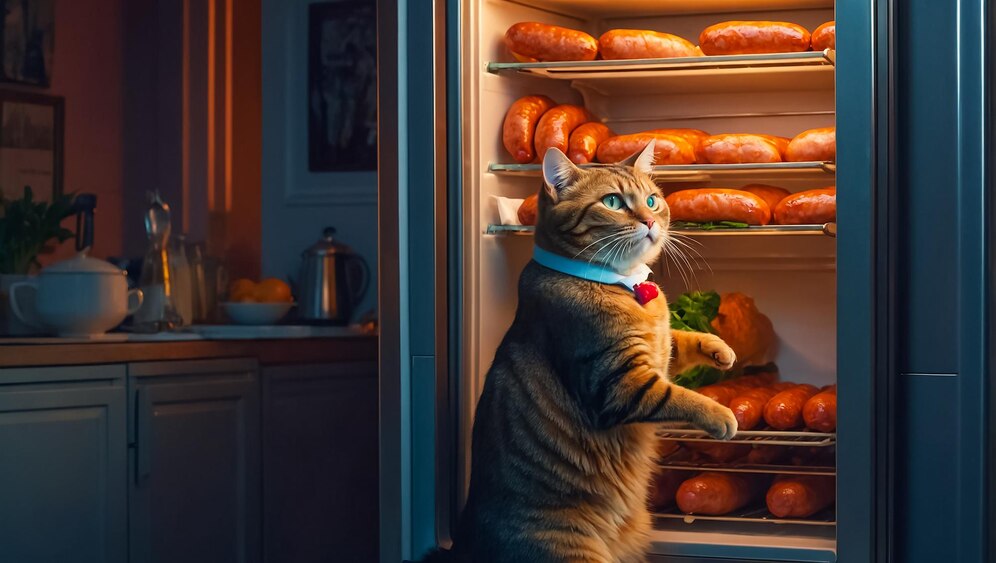When you open your refrigerator and your curious cat peers inside, you might wonder which human foods are safe to share. While cats are primarily carnivores and should mainly eat their regular cat food, some refrigerated human foods can be safely offered as occasional treats. This comprehensive guide will help you understand what foods from your fridge are safe for your feline companion.
Safe Foods for Cats from Your Fridge:
Protein Sources:
- Fish (cooked, no bones)
- Meat (plain, cooked)
- Turkey (cooked, no seasoning)
- Eggs (cooked)
Dairy (in moderation):
- Yogurt (plain, no artificial sweeteners)
- Cheese (small amounts)
Fruits and Vegetables (small portions):
- Pumpkin (plain, cooked)
- Sweet potatoes (cooked)
- Peas
- Blueberries
- Watermelon (no seeds)
- Bananas (occasional treat)
- Mixed vegetables (cooked, plain)
Grains:
- Rice (plain, cooked)
- Oatmeal (cooked, plain)
Safe Protein Sources from the Fridge
Cats naturally gravitate toward protein-rich foods, and several refrigerated options are safe for them. Plain, cooked chicken is an excellent choice for your cat. Make sure it’s thoroughly cooked and free from seasonings, especially garlic and onions, which are toxic to cats. Turkey and lean beef can also be offered in small portions, provided they’re cooked and unseasoned.
Fish from your fridge can be another healthy option. Cooked salmon, tuna, or mackerel provide beneficial omega-3 fatty acids. However, avoid giving raw fish, as it may contain harmful bacteria or parasites. Always ensure any fish offered is free from bones and served in moderation to prevent mercury consumption concerns.
Eggs can be a nutritious treat for your cat. Cooked eggs, whether scrambled or boiled, provide protein and essential nutrients. Never serve raw eggs, as they pose a risk of salmonella and may interfere with biotin absorption. Keep portions small and prepare them without butter, salt, or seasonings.
Safe Dairy Products in Moderation
While many cats are lactose intolerant, some dairy products can be offered in very small amounts. Plain, unsweetened yogurt contains beneficial probiotics and may be easier for cats to digest than milk. Small amounts of hard cheese, such as cheddar, can also be given as occasional treats, as they contain less lactose than other dairy products.
However, remember that adult cats generally lack the enzymes needed to properly digest dairy. If you notice any digestive upset after offering dairy products, it’s best to avoid them entirely. Always introduce new dairy items in tiny amounts to test your cat’s tolerance.
Vegetables and Fruits That Are Safe
Although cats don’t require vegetables in their diet, some cats enjoy certain produce items. Small pieces of cooked carrots or steamed broccoli can be safe treats. Some cats might show interest in cantaloupe or honeydew melon, which are safe in small amounts. However, many cats show little interest in fruits and vegetables due to their carnivorous nature.
Avoid feeding your cat any onions, garlic, or chives, as these are toxic to cats and can cause serious health problems. Also, keep grapes and raisins away from your cat, as they can cause kidney damage.
Foods to Strictly Avoid
Several common refrigerator items should never be shared with your cat. These include:
- Raw meat or fish (risk of bacteria)
- Leftover sauces or gravies (often contain harmful ingredients)
- Deli meats (high in sodium and preservatives)
- Milk (most cats are lactose intolerant)
- Citrus fruits (can cause digestive upset)
- Prepared salads with dressings
- Any foods containing garlic or onions
Safe Feeding Guidelines
When offering refrigerated human foods to your cat, follow these important guidelines:
First, always introduce new foods in small amounts to watch for any adverse reactions. Keep treats of any kind to no more than 10% of your cat’s daily caloric intake. Ensure all meat products are thoroughly cooked and free from seasonings, oils, or marinades.
Cut food into appropriately sized pieces to prevent choking hazards. Room temperature food is usually more appealing to cats than cold items straight from the fridge. Never force your cat to eat human food if they show no interest.
Signs of Food Intolerance
Watch for these signs that might indicate your cat isn’t tolerating a new food well:
- Vomiting or diarrhea
- Lethargy
- Loss of appetite
- Excessive thirst
- Changes in bathroom habits
- Unusual behavior
If you notice any of these symptoms, discontinue the new food immediately and consult your veterinarian if symptoms persist.
Special Considerations
Senior cats, kittens, or cats with health conditions may have different dietary needs and restrictions. What’s safe for one cat might not be appropriate for another. Always consult your veterinarian before introducing new foods, especially if your cat:
- Has diabetes
- Suffers from kidney disease
- Has food allergies
- Is overweight
- Is on medication
- Has gastrointestinal sensitivities
Read Further



